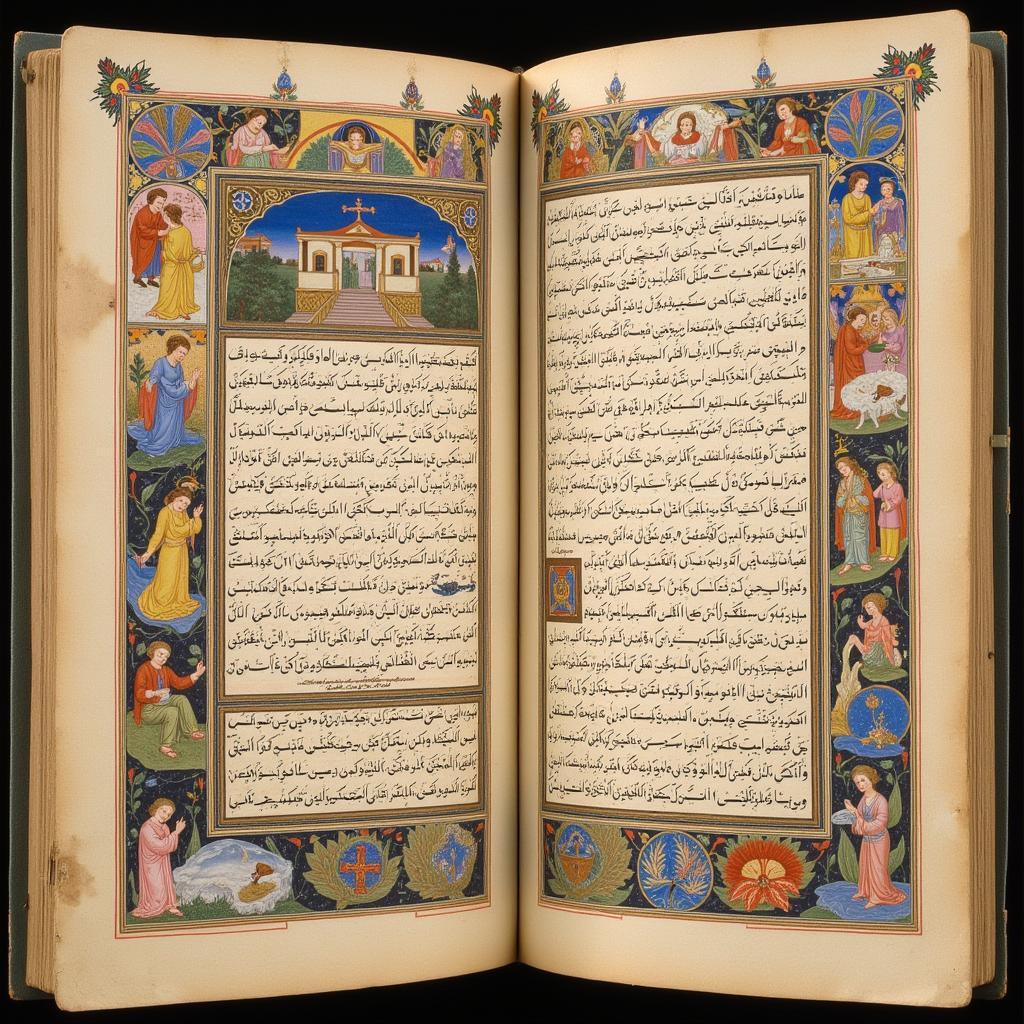Exploring the Diverse World of African Holy Books
The term “African Holy Book” might evoke images of a single, unified text revered across the continent. However, the reality is far more nuanced and fascinating. Africa, with its rich tapestry of cultures and ancient civilizations, is home to a diverse array of spiritual beliefs and sacred texts. These books, often passed down orally through generations before being transcribed, offer invaluable insights into the philosophies, cosmologies, and moral principles that have shaped African societies for centuries.
Unveiling the Tapestry of African Spiritual Traditions
It’s crucial to understand that the concept of a “holy book” in Africa doesn’t always align with the Western understanding centered on scriptures like the Bible or the Quran. While written texts hold significant importance in some traditions, oral literature, rituals, and the transmission of knowledge through generations often play equally vital roles in preserving and propagating African spiritual wisdom.
For instance, among the Yoruba people of West Africa, the Ifa Corpus stands as a vast and complex system of divination and wisdom. While portions of it have been transcribed, the heart of Ifa lies in the oral traditions, memorized and recited by priests known as Babalawos, who interpret the verses to provide guidance and insights into various aspects of life.
Similarly, in East Africa, the Maasai people revere their oral histories, songs, and stories as sacred. These narratives, passed down from elders to younger generations, encapsulate their beliefs about creation, morality, and their relationship with the natural world.
Delving into Written African Holy Books
While oral traditions hold a paramount place in many African cultures, the continent also possesses a compelling collection of written sacred texts. These books reflect the diversity of religious beliefs found across Africa, ranging from indigenous faiths to religions influenced by Christianity, Islam, and other global traditions.
The Kebra Nagast: Ethiopia’s Epic of Kings and Divinity
In Ethiopia, the Kebra Nagast, meaning “Glory of Kings,” occupies a position of profound religious and cultural significance. This epic text, written in Ge’ez, the ancient liturgical language of Ethiopia, intertwines biblical narratives with Ethiopian history and folklore.
The Kebra Nagast recounts the legendary lineage of Ethiopian emperors, tracing their ancestry back to King Solomon and the Queen of Sheba. It also narrates the story of how the Ark of the Covenant, containing the Ten Commandments, arrived in Ethiopia, where it’s believed to be housed to this day. The book holds special significance for Rastafarians, who revere it as a testament to the divinity of Ethiopian emperors, particularly Emperor Haile Selassie I, whom they regard as the embodiment of God.
 Ethiopian Kebra Nagast Manuscript
Ethiopian Kebra Nagast Manuscript
The Book of Mormon: An American Scripture with African Roots
Interestingly, even scriptures originating outside Africa, like the Book of Mormon, find resonance within certain African communities. The Book of Mormon, a sacred text of the Church of Jesus Christ of Latter-day Saints, includes accounts of ancient prophets who traveled to the Americas, some of whom are believed to have originated from Africa.
This connection to ancient American civilizations, some of which may have had transatlantic ties with Africa, has resonated with individuals seeking spiritual connections and historical insights into the African diaspora.
Understanding African Holy Books: A Multifaceted Perspective
When exploring the vast and diverse world of African holy books, it’s essential to approach the topic with sensitivity and respect. Here are some key points to consider:
-
Diversity: Africa is home to a multitude of religions and spiritual traditions, each with its own set of beliefs and practices. There is no single “African religion” or “African holy book.”
-
Oral vs. Written: While written texts hold significance, oral traditions are equally important in many African cultures. These traditions often provide the context for understanding written texts.
-
Context: It’s crucial to understand the historical, cultural, and social contexts in which these books were written and are used.
-
Respect: Always approach these texts and traditions with respect, seeking to learn and understand rather than judge or misinterpret.
Frequently Asked Questions about African Holy Books
What are some other examples of African holy books?
Beyond the Kebra Nagast and the Ifa Corpus, other notable examples include the Bibles translated into various African languages, reflecting the significant presence of Christianity across the continent. Additionally, the Quran, the holy book of Islam, holds immense significance in many African nations, particularly in North and East Africa, where Islam has a long and rich history.
How have African holy books influenced contemporary African societies?
African holy books continue to shape various aspects of contemporary African societies. They provide moral and ethical frameworks, influence legal systems and social norms, and offer solace, guidance, and a sense of identity in a rapidly changing world.
Are African holy books accessible to people outside of Africa?
Yes, many African holy books, both written and oral, are becoming increasingly accessible to a global audience. Translations, academic research, and cultural exchange programs are contributing to a greater understanding and appreciation of these rich traditions.
Exploring Further: A Journey into African Spirituality
This article has merely scratched the surface of the vast and fascinating world of African holy books. To delve deeper into this rich tapestry of spiritual traditions, consider exploring:
- Academic research: Numerous scholars specialize in African religions and literature.
- Cultural institutions: Museums, libraries, and cultural centers often house collections related to African spiritual traditions.
- Community engagement: Connecting with African communities and spiritual leaders can provide invaluable insights.
Remember, understanding African holy books requires a commitment to open-mindedness, respect, and a willingness to embrace the beauty of cultural and religious diversity.
If you have any further questions or need assistance with your exploration of African culture and spirituality, our team is here to help. Please don’t hesitate to contact us:
Phone Number: +255768904061
Email: kaka.mag@gmail.com
Address: Mbarali DC Mawindi, Kangaga, Tanzania
Our dedicated customer support team is available 24/7 to answer your queries and provide guidance.

